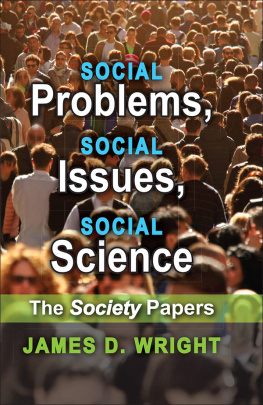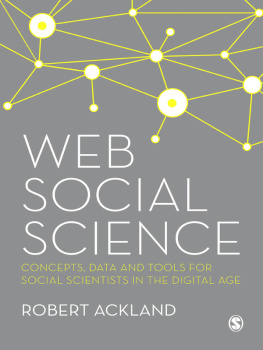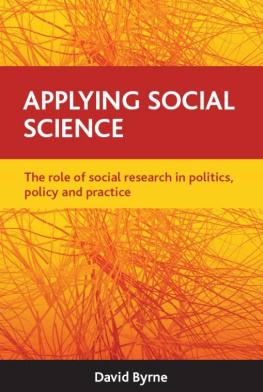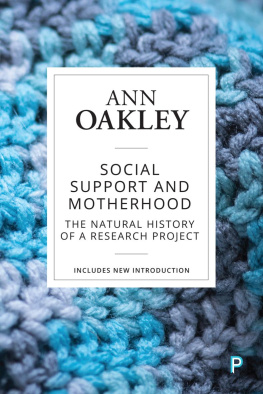THE SOCIAL SCIENTIFIC GAZE
Public Intellectuals and the Sociology of Knowledge
Series Editors
Dr Andreas Hess, University College Dublin, Ireland
Dr Neil McLaughlin, McMaster University, Canada
The sociology of knowledge has a long and distinctive history. Its function has always been that of attempting to bridge the aspirations of the discursive and institutional founding fathers of sociology with that of modern attempts to define the discipline through the study of the emergence, role and social function of ideas. However, since Mannheim first outlined his program in the 1920s, the sociology of knowledge has undergone many changes. The field has become extremely differentiated and some of its best practitioners now sail under different flags and discuss their work under different headings. This new series charts the progress that has been made in recent timesdespite the different labels. Be it intellectual history Cambridge-style, the new sociology of ideas which is now gaining strength in North America, or the more European cultural analysis which is associated with the name of Bourdieu, this series aims at being inclusive while simultaneously striving for sociological insight and excellence. All too often modern attempts in the sociology of knowledge, broadly conceived, have only looked at form while they downplayed or disregarded content, substance of argument or meaning. This series will help to rectify this.
The Social Scientific Gaze
The Social Question and the Rise of Academic Social Science in Sweden
PER WISSELGREN
Ume University, Sweden
Translated by David Jones
First published 2015 by Ashgate Publishing
Published 2016 by Routledge
2 Park Square, Milton Park, Abingdon, Oxon OX14 4RN
711 Third Avenue, New York, NY 10017, USA
Routledge is an imprint of the Taylor & Francis Group, an informa business
Copyright Per Wisselgren 2015
Per Wisselgren has asserted his right under the Copyright, Designs and Patents Act, 1988, to be identified as the author of this work.
All rights reserved. No part of this book may be reprinted or reproduced or utilised in any form or by any electronic, mechanical, or other means, now known or hereafter invented, including photocopying and recording, or in any information storage or retrieval system, without permission in writing from the publishers.
Notice:
Product or corporate names may be trademarks or registered trademarks, and are used only for identification and explanation without intent to infringe.
British Library Cataloguing in Publication Data
A catalogue record for this book is available from the British Library
The Library of Congress has cataloged the printed edition as follows:
Wisselgren, Per, 1967- author.
The social scientific gaze : the social question and the rise of academic social science in Sweden / by Per Wisselgren.
pages cm. (Public intellectuals and the sociology of knowledge)
Includes bibliographical references and index.
ISBN 978-1-4724-4759-3 (hardback)
1. Social sciences Study and teaching (Higher) Sweden. 2. Social sciences Sweden History. I. Title.
H62.5.S8W57 2015
300.711485--dc23
2015024496
ISBN 9781472447593 (hbk)
Contents
Acknowledgements
This book offers a historical case study in the sociology of knowledge. From a reflexive point of view it should be acknowledged that the making of this study would not have been possible without the intellectual, social and economic support of a number of persons, thought collectives, networks and institutions.
The study was originally written in Swedish as a dissertation in the History of Science and Ideas and published by Brutus stlings Bokfrlag Symposion. In 2009 I received a generous grant from Ume University which made it possible not only to translate the manuscript into English but also to spend a term as visiting fellow at the Max Planck Institute for the History of Science (MPIWG) in Berlin and the Faculty of Social Science at the University of Potsdam to work with the revision of the dissertation. Shortly after that I was lucky to get in contact with Ashgate and its team which has guided me with a safe hand through the subsequent editorial process.
I am very grateful to my Swedish publisher Brutus stling for his kind permission to have the manuscript translated and published in English; to Ume University for the Young Researcher Award; to David Jones for his marvellous job with translating the text; to MPIWG and the University of Potsdam for stimulating research stays; to Andreas Hess, Neil McLaughlin, Claire Jarvis and the rest of the team at Ashgate for encouragements and the professional editing of the book.
I am still also, of course, heavily indebted to all those who were involved in the preparation of my original Swedish dissertation: first and foremost my two excellent supervisors Ronny Ambjrnsson and Roger Qvarsell, but also those who read and commented on either the full manuscript Peder Alx, Nils Edling, Anders Ekstrm, Ann-Katrin Hatje, Anna Larsson, Frans Lundgren and Birgit Petersson or separate chapters sa Andersson, Henrik Bjrck, Pr Eliasson, Stefan Gelfgren, Maria Gransdotter, Marika Hedin, Lars Hnstrm, Kjell Jonsson, Erland Mrald, Karin Nordberg, Christer Nordlund and Mikael Sjgren.
Thanks once again also to the helpful staff at the different archives and libraries visited (listed in the reference section).
In the years that have passed since the publication of my Swedish dissertation and this translated, shortened and updated version, I have also been fortunate to spend time at a number of research institutions in Stockholm, Brighton, Uppsala, London, Berlin and Potsdam and be involved in different collaborative research projects and stimulating discussions which in various ways have further enriched the original analyses. The most central persons in these contexts have been Sverker Srlin, Jennifer Platt, John Holmwood, Martin Bulmer, Carol Dyhouse, Eileen Yeo, Bjrn Wittrock, Gran Therborn, Barbro Klein, Torbjrn Gustafsson Chorell, Tore Frngsmyr, Hedvig Ekerwald, E. Stina Lyon, Christian Fleck, Anders Ekstrm, Solveig Jlich, Frans Lundgren, Christina Florin, Annika Berg, Staffan Bergwik, Lena Eskilsson, Stefan Svallfors, Carita Bengs, Rickard Danell, Anna Larsson, Raewyn Connell, Wiebke Keim, Henrik Chetan Aspengren, Gurminder Bhambra, Sujata Patel, Peter Baehr, Kristoffer Kropp, Lorraine Daston, Christine von Oertzen, Annette Vogt, Irmela Gorges and Theresa Wobbe.
In spite of all the invaluable help, support and good advice that I have received along the way, there may of course still be some errors. Needless to say, the responsibility for any remaining omissions is mine only.
My final and most important thank goes to my beloved family: Maria, Amanda and Albin. This book is dedicated to you!
Srmjle, July 2015,
Per Wisselgren
Chapter 1
Introduction: The Testament
On Sunday 29 November 1885 Viktor Lorn signed his last will and testament. It was a solemn occasion. Three childhood friends had been summoned to his temporary residence in central Stockholm to witness the event. A lifes work was about to reach its culmination. Though only 28 years old, Lorn had been planning his testament for more than six years. He had asked his closest friends their opinions about the practical details, formal requirements and the correct wording in the strictest confidence. The first draft had been drawn up a good five years earlier. But in it, as in each new version after careful consideration he had discovered some minor shortcoming, some room for improvement. In the final version which now lay before him each word, each small detail had been carefully considered. According to the archived records, Lorn seemed to be very pleased with the result.








